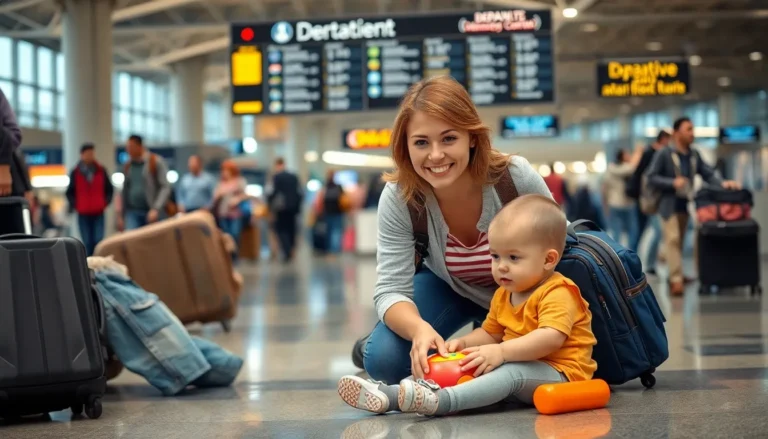Navigating the wild world of co-parenting can feel like trying to assemble IKEA furniture without the instructions—frustrating and full of unexpected surprises. But fear not! Co-parenting classes are here to transform that chaos into a well-oiled machine. These classes offer practical tools and strategies to help parents communicate effectively and work together for their kids’ sake, all while avoiding the pitfalls of passive-aggressive text messages.
Imagine turning those awkward exchanges into smooth conversations, all while keeping the kids’ best interests at heart. With the right guidance, co-parenting can be less of a juggling act and more of a synchronized dance. So, if you’re ready to swap the drama for teamwork and gain valuable insights, co-parenting classes might just be your new best friend. After all, who wouldn’t want to navigate this parenting rollercoaster with a little more grace and a lot less stress?
Table of Contents
ToggleOverview of Co Parenting Classes
Co-parenting classes offer essential guidance for parents navigating shared responsibilities. They provide valuable tools to enhance communication and foster collaboration.
Definition of Co Parenting
Co-parenting defines a collaborative parenting relationship between two or more adults caring for children. This arrangement involves making joint decisions regarding education, health, and welfare. Effective co-parenting requires mutual respect, clear communication, and a commitment to prioritizing the children’s needs. Navigating this relationship benefits from structured support such as classes that promote understanding and empathy.
Importance of Co Parenting Classes
Co-parenting classes emphasize skills vital for effective collaboration. They teach strategies for managing conflicts and improving communication, essential for a successful co-parenting dynamic. Parents learn to develop parenting plans that align with their children’s needs, ensuring both parties remain focused on their well-being. Such classes reduce misunderstandings and enhance teamwork. By participating, parents increase their ability to work together seamlessly, ultimately benefiting their children’s emotional and social development.
Types of Co Parenting Classes

Co-parenting classes come in various formats, each offering unique benefits tailored to different preferences.
In-Person Classes
In-person classes provide an interactive environment for co-parents. Participants engage directly with instructors and fellow parents, fostering immediate feedback and group discussions. Structured sessions cover essential topics like communication techniques and conflict resolution strategies. Each class usually runs for several weeks, promoting consistent learning and practice. Networking opportunities arise as parents connect and share experiences, building supportive relationships. Class sizes vary from small groups to larger sessions, accommodating different comfort levels.
Online Classes
Online classes offer flexibility and convenience for busy co-parents. Participants can access materials at their own pace, making it easier to fit lessons into their schedules. Typically, these classes include video modules and interactive quizzes to reinforce learning. Many platforms provide forums for discussion, enabling parents to engage with others while maintaining anonymity. Course lengths generally range from a few hours to several weeks, allowing for varied commitment levels. Online options often expand the range of topics available, catering to specific needs and circumstances.
Benefits of Co Parenting Classes
Co-parenting classes offer significant advantages for parents seeking to enhance their collaborative relationships. These classes improve communication skills and foster better conflict resolution techniques.
Improved Communication Skills
Effective communication forms the backbone of successful co-parenting. Participants learn to express their thoughts clearly and listen actively, which helps in understanding each other’s perspectives. As parents practice these skills, they reduce misunderstandings and build trust. Furthermore, classes emphasize non-verbal cues and empathy, equipping parents with tools to communicate respectfully and positively. Enhanced communication capabilities lead to more productive discussions, allowing parents to work together toward shared goals.
Better Conflict Resolution
Conflict resolution is another critical benefit of co-parenting classes. Parents receive training on identifying triggers and managing emotional responses during disagreements. Strategies for approaching disputes calmly encourage constructive dialogue rather than escalation. Techniques such as mediation and compromise become integral parts of resolving conflicts effectively. As parents adopt these practices, they create a more harmonious environment for their children. Ultimately, improved conflict resolution skills contribute to healthier co-parenting relationships and foster stability in children’s lives.
How to Choose the Right Co Parenting Class
Selecting a co-parenting class requires careful consideration of several factors to ensure it meets individual needs.
Factors to Consider
Assessing class duration is crucial. Some classes span a few weeks while others may cover topics in a single session. Identify the teaching method that aligns with learning preferences. In-person classes encourage interaction, whereas online classes offer convenience. Review the curriculum; it should cover essential topics like communication and conflict resolution. Consider the instructor’s qualifications and experience in co-parenting education. Class size can also impact learning; smaller groups often facilitate better interaction and engagement.
Questions to Ask Instructors
Inquire about the class structure. Understanding the format helps gauge whether it fits personal schedules. Ask about the specific topics taught to ensure they address relevant challenges. Clarify if emotional support is part of the curriculum; this can be vital for navigating personal situations. Find out how instructors manage group dynamics and encourage participation. Discuss the resources provided, like handouts or follow-up support. Lastly, confirm the class’s success rate or testimonials from previous participants, as this feedback offers valuable insights into the effectiveness of the program.
Conclusion
Co-parenting classes are invaluable resources for parents navigating the complexities of shared responsibilities. By equipping individuals with essential communication and conflict resolution skills, these classes foster healthier relationships and create a supportive environment for children. Whether opting for in-person or online formats, parents can find tailored solutions that fit their unique situations. Investing time in co-parenting education not only enhances collaboration but also prioritizes children’s emotional well-being, paving the way for a more harmonious family dynamic. Embracing this journey together can lead to lasting positive outcomes for everyone involved.



